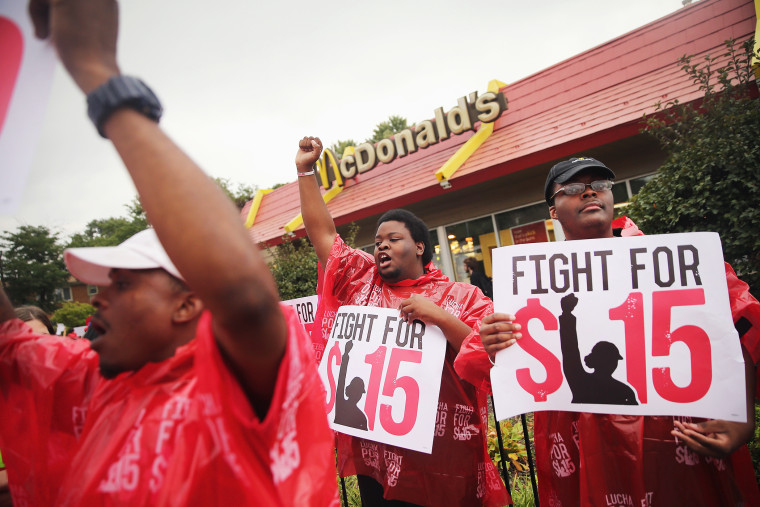An impending legal showdown between the National Labor Relations Board (NLRB) and the franchising industry could have serious consequences for the future of American labor relations. On Thursday, International Franchise Association (IFA) president Steve Caldeira told reporters that the NLRB had recently "opened a Pandora's Box" of labor complaints against franchisors, and that the IFA had every intention of fighting back.
RELATED: Fast food strikes hit 150 US cities
"Franchising is under serious attack by a group of un-elected Washington bureaucrats beholden to labor bosses," he said during a Thursday conference call, referring to the NLRB.
The attack, as Caldeira referred to it, began over the summer when NLRB general counsel Richard Griffin direct the board's regional offices to regard the McDonald's Corporation as a "joint employer" with its franchised locations. If McDonald's is a joint employer, that makes it legally liable for any labor law violations that occur at franchised restaurants. The franchising industry maintains that franchisors such as McDonald's are not joint employers, and are therefore not legally on the hook for maintaining workplace standards at locations owned by franchisees.
The NLRB's decision was a victory for the Fight For 15 movement of striking fast food workers and the labor groups that back them. By potentially making corporations like McDonald's legally liable for the workplace conditions at its franchised locations, the NLRB has made it possible for the labor movement to exert direct legal pressure on them. In Caldeira's words, "the floodgates have opened because of the general counsel's opinion."
"Franchising is under serious attack by a group of un-elected Washington bureaucrats beholden to labor bosses."'
The NLRB has yet to issue a complaint naming McDonald's as a joint employer. During a Friday appearance at West Virginia University, Griffin reportedly conceded that such a complaint might run into "a problem legally."
"The status of those cases right now is, no complaints have actually issued," he said according to an exclusive report from Politico. "There are ongoing discussions with the parties about whether to resolve those cases; about, if they're not resolved, how to try them; and those discussions are not at a conclusive point."
Caldeira took Griffin's remarks as confirmation of his own view: That the NLRB's new joint employer policy is "ridiculous."
"To be very clear, franchisees pay an initial franchise fee and ongoing royalty payments to use franchisors' trademarks," he said. "Otherwise, franchisees are independent."
But workers affiliated with the fast food workers' movement have initiated a separate legal fight with the intention of proving otherwise. Earlier this year, employees at McDonald's franchises in New York, Michigan and California sued the parent company over allegations of wage theft, claiming that McDonald's headquarters exerts careful control over franchised locations through computer software which tracks hourly labor costs. Although IFA said on the Thursday call that it could not discuss conditions within McDonald's or any other specific franchise, attorney Michael Lotito dismissed the notion that proprietary software was evidence that a franchisor exerted control over a franchisee.
RELATED: Franchise Association sues over Seattle's $15 wage
"If you do have a software program that provides you with pertinent, relevant information with regards to staffing sales and the like, that doesn't necessarily mean that the franchisor is making the employment related decisions that the franchisee is making with its employees," said Lotito, who co-chairs Littler's Workplace Policy Institute. "Instead, what the franchisor is providing is information."
